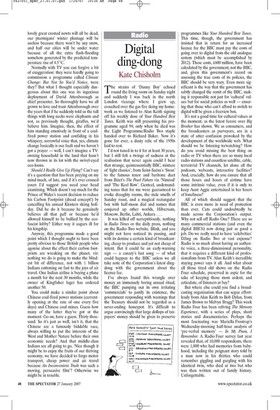Digital ding-dong
Kate Chisholm The strains of 'Danny Boy' echoed round the living room on Sunday night and suddenly I was back in the north London vicarage where I grew up, crouched over the gas fire doing my homework as we listened to Alan Keith signing off his weekly dose of Your Hundred Best Tunes. Keith was still presenting his programme aged 94; only when he died was the Light Programme/Radio Two staple handed over to Richard Baker. Now it's gone for ever, a dusty relic of the 1950s laid to rest.
I'd not tuned in to it for at least 30 years, but I still felt a twinge of sadness at the realisation that never again could I hear that strange, quintessentially BBC, mixture of 'light classics', from Saint-Saens's 'Swan' to the famous tenor and baritone duet from Bizet's The Pearl Fishers via 'Nimrod' and 'The Keel Row'. Genteel, undemanding tunes that for me were guaranteed to evoke draughty rooms, the stale smells of Sunday roast, and a magical rectangular box with half-moon dial and names that conjured up other worlds, Hilversum, Moscow, Berlin, Lahti, Ankara. . .
It was killed off surreptitiously, nothing in Radio Times or the daily press, nothing on the Radio Two website. Blink, and you might not have noticed its passing, and with its demise a certain kind of broadcasting, cheap to produce and yet not cheap of intent. But it could be an early-warning sign — a canary's last song — of what could happen to the BBC unless we all take note of the Corporation's latest dingdong with the government about the licence fee.
I've always found this wrangle over money an immensely boring annual ritual, the BBC pumping out its own irritating 'commercials' to justify its existence, the government responding with warnings that the Treasury should not be regarded as a never-ending honeypot. It's difficult to argue convincingly that large dollops of taxpayers' money should be given to preserve programmes like Your Hundred Best Tunes. This time, though, the government has insisted that in return for an increased licence fee the BBC must pay the costs of going over to digital from the old analogue system (which must be accomplished by 2012). These costs, £600 million, have been calculated by the government, not the BBC, and, given this government's record on assessing the true costs of its policies, the BBC should be very wary. Even more significant is the way that the government has subtly changed the remit of the BBC, making it responsible not just for 'cultural' values but for social policies as well — ensuring that those who can't afford to switch to digital will be given a freeview box.
It's not a good time for cultural values at the moment, as the latest furore over Big Brother has shown. We as consumers, and the broadcasters as purveyors, are in a state of utter confusion provoked by the development of the worldwide web. What should we be listening to/watching? How do you avoid missing the best thing on radio or TV when there are so many local radio stations and countless satellite, cable, terrestrial TV channels, let alone all the podcasts, webcasts, interactive facilities? And, crucially, how do you ensure that all those hours and hours of airtime have some intrinsic value, even if it is only to keep Aunt Aggie entertained in her hours of loneliness?
All of which should suggest that the BBC is even more in need of protection than ever. Cuts could undoubtedly be made across the Corporation's output. Why not sell off Radio One? There are so many commercial stations (and even the digital BBC6) now doing just as good a job. Do we really need to have 'celebrities' DJing on Radio Two at vast expense? Radio is so much about having an authentic voice, a three-dimensional personality, that it requires a different kind of professionalism from TV. Alan Keith's incredible staying power says it all. And what about all those tired old shows on the Radio Four schedule, preserved in aspic for the sake of keeping those most ardent, and articulate, of listeners at bay?
But where else could you find a broadcasting organisation that can segue effortlessly from Alan Keith to Bob Dylan, from James Brown to Melvyn Bragg? This week Radio Four has been reliving The Memory Experience, with a series of plays, short stories and documentaries. Perhaps the most fascinating was Mariella Frostrup's Wednesday-morning half-hour analysis of 'pre-verbal memory' — In My Pram, I Remember A Radio Four survey last year revealed that, of 10,000 respondents, there were 1,800 who had memories from babyhood, including the poignant story told by a man now in his thirties who could remember giggling and gurgling with his identical twin, who died at two but who was then written out of family history. Unforgettable.














































 Previous page
Previous page